Silence and Fascism, one leds to the other.
A good LIBERAL friend of mine sent me this interview with Aaron Russo, it KNOCKED MY SOCKS OFF. I had heard of this man before but had no idea the scope of his character. He is not just a director/producer of great fictional and nonfictional movies, he cares about our America and is doing something about the direction we are all being dragged or pulled towards by the neo-cons now in control and that is the ideology of FASCISM.
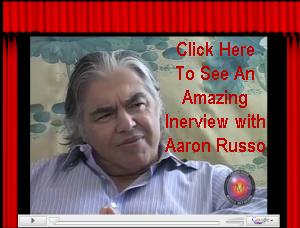 (Fascism is a radical political ideology that combines elements of corporatism, authoritarianism, nationalism, militarism, anti-anarchism, anti-communism and anti-liberalism.)
(Fascism is a radical political ideology that combines elements of corporatism, authoritarianism, nationalism, militarism, anti-anarchism, anti-communism and anti-liberalism.)
Some of the revelations you will hear in this meeting of the minds may seem "over the top" but that is what we sheepal who take freedom for granted need - a little bounce "over the top" to awaken us before it's too late. His political libertarian opinions may seem a little too exaggerated for most of us who have labeled ourselves LIBERAL and PROGRESSIVE but we, especially myself, can identify with his convictions far more easily than those of the conservative right... as in the statements below: Libertarians find themselves in an odd position these days, circumstantially alongside many on the Left in our opposition to those on the Right who happen to hold power. On the issues of war, civil liberties, and even fiscal solvency, the Left appears more sane, or at least less recklessly insane, than the militarist Right. LINK HERE
~~~~~~~~~~~~~~~~~~~~~~~~~~~~~~~~~~
Liberals favor government action to promote equality, whereas conservatives favor government action to promote order. Libertarians favor freedom and oppose government action to promote either equality or order. LINK HERE
I'm not sure exactly what we can do to stop the movement towards stringent socioeconomic controls and oppression but BEING AWARE THAT IT IS HAPPENING is a start. thinkingblue aka Carolyn
“There can be no really pervasive system of oppression . . .without the consent of the oppressed” (Florynce R. Kennedy).
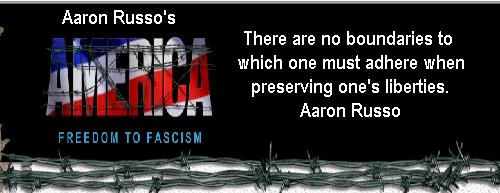
An interview by consciousmedianetwork.com of Aaron Russo about his new film, America: Freedom to Fascism. In this film Russo sets out to find the law that requires American citizens pay a direct income tax. This interview contains info about the fiat currency owned by private, for profit bank that we call "dollars". He explains how the Federal Reserve is neither 'Federal' nor has any reserves. He also gives a spot on critique of Michael Moore's Fahrenheit 911 . America: Freedom to Fascism is opening in USA . the 14 min. trailer to the film.
fromfreedomtofascism.com
PS: Also, please read the essay below, another great eye opener...
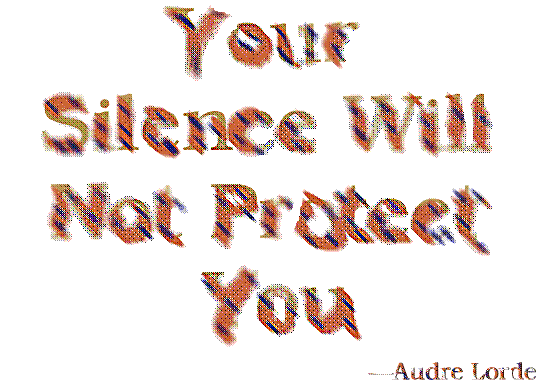 Breaking the Silence of the Night
Breaking the Silence of the Night
By Ron Kovic Truthdig Wednesday 11 October 2006
A time comes when silence is betrayal.- Martin Luther King Jr., 4/04/67
It all begins somewhere, the questioning, the doubting, the feeling that something's not right; like that day the captain set fire to the Vietnamese woman's hooch, or the night we shot those women and children by mistake. It's all got to start somewhere. For them it might have been the innocent civilians killed that day at the checkpoint just north of Baghdad or the dead children lying in the road in Kirkuk, or that night in Nasiriyah when they kicked in the front door of that house, screaming and cursing at the children as they threw their father to the floor, tying his hands behind his back and putting a hood over his head, but you remain silent, you say nothing. You've been taught to follow orders, to obey and not question, to go along with the program and do exactly what you're told. You learned that in boot camp.
You learned that the very first day at Parris Island when the drill instructors started screaming at you. It is "Yes sir" and "No sir," and nothing in between. There is the physical and verbal abuse, the vicious threats and constant harassment to keep you off balance. It is a powerful conditioning process, a process that began long ago, long before we signed those papers at the recruit stations in our hometowns, a process deeply ingrained in the American culture and psyche, and it has shaped and influenced us from our earliest childhood.
Born on my country's birthday in 1946, I had grown up in the shadow of the Cold War after the great victory of World War Two. Both my mother and father had served in the Navy during that war. It was where they met and were married, and we their children were to be called the "Baby Boom." It was a beautiful time, a time of innocence, a time of patriotism, a time of loyalty, conformity and obedience. The threat of Communism was everywhere. We did not question. We did not doubt. We believed and we trusted our leaders. America was always right. How could we ever be wrong? We were the most powerful nation on earth and we had never lost a war, but all that was to change, all that was to be shattered in Vietnam.
I can still remember marching on Memorial Day, our parents on the sidewalks waving their American flags proudly. There were the war movies and the Sergeant Rock comic books, the toy guns that we got for Christmas, and the little plastic green soldiers that I played with in my backyard, fighting the Japs and the Germans, attacking the imaginary bunkers with our bazookas and flamethrowers, dreaming that someday like our fathers before us we would become men.
I volunteered for my first tour of duty in Vietnam in 1965, only to return to a country deeply divided. I remember tears coming to my eyes when I saw a photograph in the newspaper of the American flag being burned at an antiwar rally in New York City. I was outraged and became determined to set my own example of patriotism and volunteered to go to Vietnam a second time, ready to die for my country if need be. Before leaving I purchased a diary that I promised to keep during my second tour of duty. I still have that diary today, and though it is a bit worn and frayed the words that I wrote nearly four decades ago are still there. On January 18th, 1968, two days before I was shot and paralyzed, I wrote, "Time is going fast in a way, while in other ways it seems I've been here 100 years. I love my great nation and am ready to die for freedom." Just below I had written the quote,
Fear not that ye have died for naught
The torch ye threw to us we caught.
Ten million hands will hold it high,
And Freedom's light shall never die!
We've learned the lesson that ye taught
In Flanders fields. - R.W. Lillard
Like many Americans who served in Vietnam and those now serving in Iraq, and countless other human beings throughout history, I had been willing to give my life for my country with little knowledge or awareness of what that really meant. I trusted and believed and had no reason to doubt the sincerity or motives of my government. It would not be until many months later at the Bronx Veterans Hospital in New York that I would begin to question whether I and the others who had gone to that war had gone for nothing.
It was a violent spring. Martin Luther King had been killed in Memphis and I had just begun reading Senator Robert F. Kennedy's book "To Seek a Newer World" at the Bronx VA when Kennedy was assassinated at the Ambassador Hotel in Los Angeles. Kennedy had been the antiwar candidate, and I remember picking up his book with hesitation at first, his views seeming so very different from my own back then, but there was something that drew me toward him and his call to end the war that spring. Maybe it was the wounded all around me on the paraplegic ward, or the hundreds of Americans who continued to die each week, but I remember feeling deeply saddened when he died, just as I had when his brother, President John F. Kennedy, had been killed in Dallas in 1963.
I had been so certain of victory, but each day now I began to realize more and more that we were not going to win in Vietnam, and that realization was painful and devastating. I felt betrayed and could not understand why my government had not done all that it could to win the war. Did they have any idea how much we had sacrificed, how many had already died and been maimed like myself? I felt sad and depressed and would often go down to the hospital library on the first floor, where I would read for hours at a time trying to forget the war. The first book that I read was about the life of Vice President Hubert Humphrey, and I remember listening to his voice on the Armed Forces Radio during my second tour of duty and writing in my diary how much hearing him and his determination to stay the course and not give up in Vietnam had inspired me. Several days later I discovered the diary of Che Guevara, the Cuban revolutionary who had gone to Bolivia and was later killed there while attempting to inspire a revolution. I felt uneasy at first holding the book in my hands as I sat paralyzed in my wheelchair, afraid that someone might come up to me and catch me reading about the "enemy," but I now wanted to know who this enemy was, who were these people I had been taught to hate and sent to fight and kill.
I remember watching the 1968 Chicago Republican National Convention on TV with other paralyzed veterans in their wheelchairs, the crowds in the streets outside the convention hall chanting, "The whole world is watching! The whole world is watching!" as antiwar demonstrators were beaten and bloodied by police and dragged into waiting paddy wagons. Most of my fellow veterans were angry at the protesters, cursing them and calling them traitors, but I remember feeling very differently that night. What the police had done was wrong, and for the first time, though I did not share it with anyone yet, I began to sympathize with the demonstrators.
It was not long after that that I left the hospital and began attending classes at Hofstra University on Long Island, determined to rise above what had happened to me and begin a new life after the war. It was a quiet and peaceful campus, so different from Vietnam and the hospital, and it was at the university that I was to first hear the passionate exchange of ideas and different points of view. Many of the discussions had to do with the war and why it had to end. There were the lit candles and the moratoriums, the John Lennon song "Give Peace a Chance," and I remember listening to the Woodstock album and hearing Jimi Hendrix's wild rendition of the "Star Spangled Banner" for the first time. There was the infamous My Lai massacre poster, "And babies too?" It was shocking and I could not help but think back to that night during my second tour of duty when we shot those women and children by mistake, all those bloody bodies, the old man with his brains hanging out and that Vietnamese child whose foot had nearly been shot off, dangling by a thread.
I continued to attend classes, still keeping my thoughts and feelings about the war deep inside of me and sharing them with no one.
It was during this period that I read Henry David Thoreau's essay "Civil Disobedience" and was immediately struck by the concept of "resistance to civil government and non cooperation with evil" seeming to directly contradict what I had once believed in as a boy - that my country was always right and could do no wrong. The whole idea that we as citizens had a right to follow our conscience and resist laws that were unjust and immoral had a powerful effect on me. I was later to learn that Senator Joseph McCarthy had attempted to ban
Thoreau's essay... and that both Mahatma Gandhi and Martin Luther King's philosophy of creative nonviolence as a tactic for social change had been strongly influenced by their reading of "Civil Disobedience."
There was "The Autobiography of Malcolm X" and "Nigger: An Autobiography" by Dick Gregory and Joseph Conrad's "Heart of Darkness," which exposed the brutality and horror of colonialism. I remember reading Jerry Rubin's "Do It" and Abbie Hoffman's "Revolution for the Hell of It," astounded at the sheer audacity of these two "Yippie" (Youth International Party) radicals and their willingness to stand up to the most powerful government in the world and its policy in Vietnam. They were wild and outrageous, and believed in revolution and were not afraid to say it or write about it and act it out. There was the article in Ramparts magazine by the Army Green Beret Sergeant Donald Duncan, who had turned against the war, and I
remember someone from the university mentioning that a Vietnam veteran from Suffolk Community College was now heading the S.D.S. (Students for a Democratic Society) on his campus.
There were the Columbia University sit-ins and Woodstock and the alternative radio station WBAI, which I listened to in my room late at night, deeply moved by talk of protest and revolution, power to the people and provocative antiwar songs that brought tears to my eyes, giving me an entirely different perspective on what was happening in Vietnam and here at home.
America seemed to be tearing itself apart; never before had the nation been so polarized, not since the Civil War had we as a people been so divided. Everything was being questioned, nothing was sacred, even the existence of God was now suspect. The very earth beneath my feet seemed to be shifting, and there no longer seemed to be any guarantees, or anything that could be trusted or believed in anymore. Many of the students had become so angry and frustrated with the war and what was going on that they had begun to give up on America. Many wondered if we were ever really a "democracy" to begin with, while still others spoke openly of leaving the country and abandoning America forever. I continued attending my classes, trying to be a good student, but I could not help but be affected by all the things that were happening around me. Several weeks later while sitting in the back of a crowded auditorium I remember listening to the impassioned words of the late Congressman Allard Lowenstein, who had come to speak at our campus that day, fiercely condemning the war and telling us all to not give up and that it was "better to reclaim the country than abandon it!"
It was about that time I received a call from my friend Bobby Muller, whom I had first met at the Bronx Veterans Hospital only a few months before and who had also been paralyzed in Vietnam, asking me if I would join him at Levittown Memorial High School on Long Island later that week to speak against the war. I remember being hesitant at first, telling him I wasn't sure. I had never spoken in public before and the thought of giving my first speech against the war frightened me. When I got off the phone I felt an uncomfortable burning in my stomach. A part of me wanted to speak for all I had seen in Vietnam and the hospital and for all the thoughts
and feelings I had been having ever since I had begun attending classes at the university, while another part could not help but think of what might happen to me if I did. Would I be called a traitor? Would I end up in some FBI file, no longer the quiet student sitting in his wheelchair alone on the outskirts of the demonstrations but now a direct participant, a radical, a demonstrator? I would be stepping over the line and joining with the very people I had once thought of as traitors. What would my mother and father think if they found out? And the veterans at the university - what would they say? Would they feel that I had betrayed them? Bobby called me several times that week, sounding a bit impatient, but again I hesitated, telling him that I hadn't made up my mind yet. I asked him if he would call me the following morning, which was the day of the speech, saying I would let him know for sure. I could hardly sleep that night, tossing and turning, tormented by fear and doubt, trapped between the awful twilight of what might happen to me if I did speak and what I knew would continue to happen if I remained silent.
The phone rang early the next morning and I remember picking it up, telling Bobby in a voice that was still only half awake that I had decided to join him that day. It was nearly forty years ago but I can still remember driving down to the high school in my hand-controlled car thinking of all the things I wanted to say to the students. When I arrived I parked the car, transferred into my wheelchair and pushed over to the entrance of the school and into the auditorium, where Bobby was already sitting on the stage in his wheelchair talking to one of the teachers. I was carried up a few steps, where I joined him, and for a moment I remember turning my head and looking out at all the students, thinking how much they reminded me of myself only a few years before, so young and innocent, so trusting and willing to believe without question. Bobby spoke first and a few minutes later it was my turn. I approached the microphone slowly, pushing my wheelchair to the very center of the stage, and in a voice that I can still remember being a bit anxious I began to speak. I told them about the hospital first, the overcrowded conditions, the rats on the ward, and just as I began to speak about how I had been shot and paralyzed in Vietnam the fire bell rang. The auditorium quickly cleared after that, one of the teachers telling us that someone had just called in a bomb threat. I didn't know what to think at first. I remember feeling frightened, angry and outraged all at the same time! Why would anyone want to stop me from speaking? Who could that voice on the other end of the phone have been? Was it another boy, a student, a teacher, an angry parent? What could they have possibly been thinking? I would never know for sure, only that someone had made an effort to stop me from speaking that day, and that affected me deeply. We all went outside and after a brief discussion decided to go over to the high school football field, where we assembled all the students in the grandstands and I continued speaking, more determined than ever to not be silenced.
There would be Kent State and my first demonstration against the war in Washington, D.C, the VVAW (Vietnam Veterans Against the War), arrests, tapped phones, undercover agents, and many more speeches in the months and years that were to follow as my political awakening continued and I began to discover an America far different than the one I had once believed in as a boy. There were the trials and days and nights I spent in jail in my wheelchair feeling more like a criminal than someone who had risked his life for his country, but I continued to speak.
Perhaps it was survivor's guilt, or my own desperate need to be forgiven and keep others from having to come back like me, but as I sat before those crowds I began to open up my heart in a way that I had never done before, sharing everything, all the horrors and nightmares, all the things I had locked deep inside of me and had for so long been afraid to say. In many ways I was confessing the sins of America. I remember many nights driving home to my apartment after those speeches feeling exhausted and deeply troubled, unable to sleep, knowing that if I did, the nightmares would return and I would be back in Vietnam all over again; only to awaken a few hours later with my heart pounding in my chest, feeling terribly alone and wondering why I was putting myself through all this pain and agony.
It had only been a few years before that I had sat in the living room of my house in Massapequa, Long Island, with tears in my eyes listening to the words of President John F. Kennedy call my generation to "A New Frontier," urging us all to be ready to "pay any price, bear any burden, meet any hardship, support any friend, oppose any foe in order to insure the success and survival of liberty," but those words seemed hollow to me now. Somewhere along the way we had taken the wrong turn, somewhere through it all America had veered tragically off course, leaving behind our sacred ideals and betraying the very roots of our revolutionary past. Instead of the great champion of liberty we had emerged the imposter, a fraud, a dangerous, corrupt frightening monstrosity of what we had first set out to be. America had lived a terrible lie. We had been on the wrong side of history. The great defender of liberty had become the tyrant, the arrogant bully, the cruel exploiter of "the tired, the poor, the huddled masses yearning to breath free." Wearing the deceitful mask of the great liberator and promising freedom and democracy, we had robbed and raped, blackmailed and perverted our way around the world, supporting the most despicable tyrants and despots as we expanded our bloody empire, causing the death and suffering of countless human beings. I now understood what Martin Luther King had meant when he had called America "the greatest purveyor of violence in the world...."
I remember reading "State and Revolution" by Lenin and "The Prison Poems of Ho Chi Minh." There was George Jackson's "Prison Letters" and a powerful book by Felix Green called "The Enemy: What Every American Should Know About Imperialism." There was the documentary "Hearts and Minds," and the agonizing scene of the grief-stricken Vietnamese woman being held back by family members as she tried to crawl into the grave of her husband, who had just been killed in an American air strike, and the haunting scene of a terrified Vietnamese child screaming and running naked from her village after being severely burned in a napalm attack as the war raged on, and my speeches grew angry and bitter at a government I could no longer trust or
believe in anymore. There were the body counts and booby traps, body bags, "light at the end of the tunnel" and Vietnam veterans throwing their ribbons and medals away at the Capitol in Washington, D.C., outraged with a government and a war they had now come to see as unjust and immoral.
The Vietnam War finally ended in the spring of 1975 and with its end came the hope that America might change and begin to confront the painful legacy of its past. I will always remember the words of Vietnam Veteran Against the War John Kerry as he spoke before the Senate Foreign Relations Committee in the spring of 1971:
And so when thirty years from now a brother goes down the street without an arm, without a leg or a face and small boys ask why, we can say, Vietnam, and not mean a desert or some filthy obscene memory, but instead mean the place where America finally turned and where soldiers like us helped in that turning.
But tragically that "turning" was not to be, and the dream of a more peaceful and nonviolent America was put on hold by a government that continued to refuse to face the reality of the terrible crimes it had committed in our name.
For the past three and a half years I have watched in horror the mirror image of another Vietnam unfolding in Iraq. As of this writing over 2,700 Americans have died and nearly 20,000 have been wounded while tens of thousands of innocent Iraqi civilians, many of them women and children, have been killed. Refusing to learn from the lessons of Vietnam, our government continues to pursue a policy of deception, distortion, manipulation and denial, doing everything it can to hide from the American people its true intentions in Iraq. Sadly, the "War on Terror" has become a war of terror. Never before has this government through its outrageous provocations and violent aggressions placed the citizens of this country in such grave danger. Never have the people of this country been so threatened, never before has life and liberty been in such great peril; not in the two hundred and thirty years since our revolution have we as a people and a nation been at such a crucial turning point. These are dangerous times. A century of arrogance, brutality and aggression has come back to haunt us all. September 11th has happened. The mask has been ripped away. The lie has been exposed and this criminal government now stands naked before the world! These are provocative words, and the truth may be deeply unsettling but when will we speak the truth? When will we end this silence? How much longer will we wait before we are ready to finally admit that the murderer lives in our own house, that this government that we entrusted long ago with the sacred task of protecting life and liberty now, by it's every reckless, unjust and immoral action threatens the lives and liberty of us all?
Have we become so complacent, so coward and intimidated by this government that we have forgotten our own revolutionary birthright of rebellion and dissent? Have we become so paralyzed by the eleventh of September that we would give up our liberty and freedom for the promise of a security that does not exist by a government that now threatens our very lives? What will it take before we finally realize the true reality of this crisis? How many more terrorist attacks, senseless wars, flag draped caskets, grieving mothers, paraplegics, amputees, stressed out sons and daughters before we finally begin to break the silence of this shameful night? Let us open up our hearts and speak in a way we have never spoken before knowing that lives now depend on it, and the very survival of our nation is now at stake. Let not our silence in this crucial moment betray us from our destiny.
--------------------------------------------------------
Sometimes we discover unpleasant truths. Whenever we do so, we are in difficulties: suppressing them is scientifically dishonest, so we must tell them, but telling them, however, will fire back on us. If the truths are sufficiently impalatable, our audience is psychically incapable of accepting them and we will be written off as totally unrealistic, hopelessly idealistic, dangerously revolutionary, foolishly gullible or what have you. (Besides that, telling such truths is a sure way of making oneself unpopular in many circles, and, as such, it is an act that, in general, is not without personal risks. Galileo Galilei
More quotes from Galilei: All truths are easy to understand once they are discovered; the point is to discover them.
I do not feel obliged to believe that the same God who has endowed us with
sense, reason, and intellect has intended us to forgo their use.
I have never met a man so ignorant that I couldn't learn something from him.
BRING THEM HOME NOWSEE MY BLOG ON DEMORATE.ORGPROGRESSIVE LINKS
THINKING BLUE LINKS
CAROLYNCONNECTION.COM
REAL PICTURES OF WAR

CAROLYNCONNETION - I've got a mind and I'm going to use it!
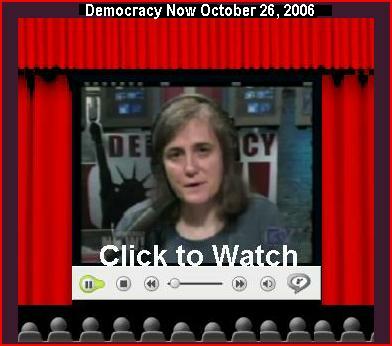
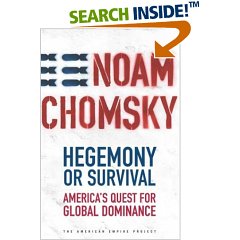 HEGEMONY OR SURVIVAL--
HEGEMONY OR SURVIVAL--





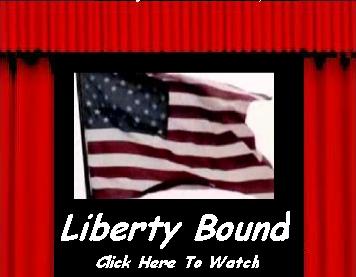

 Thinkingblue
Thinkingblue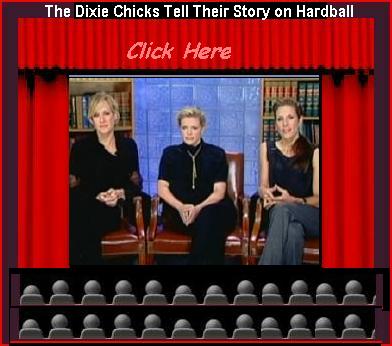

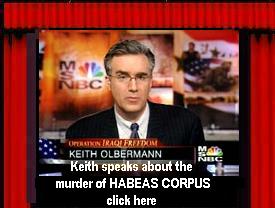
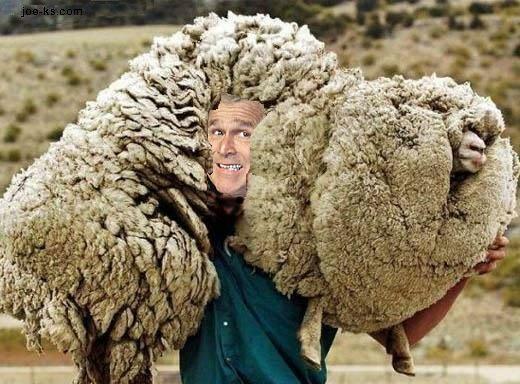 But good news! Bit by bit I'm glad to say we are finally brushing the neo-con wool, from our eyeballs... and waking up to their dastardly schemes.
But good news! Bit by bit I'm glad to say we are finally brushing the neo-con wool, from our eyeballs... and waking up to their dastardly schemes.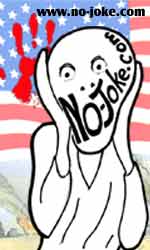



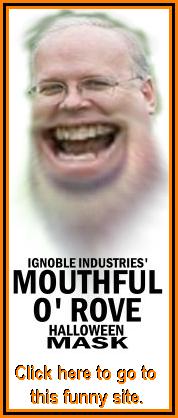
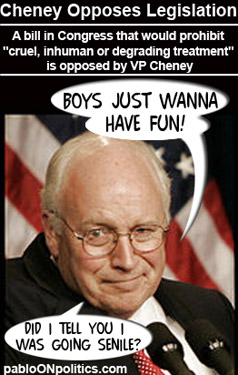
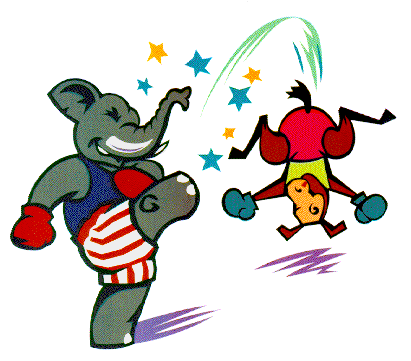
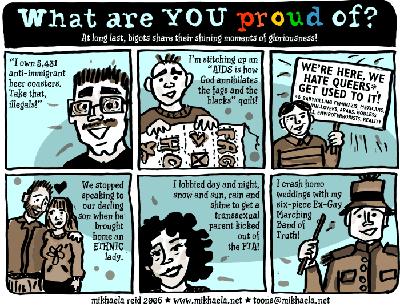

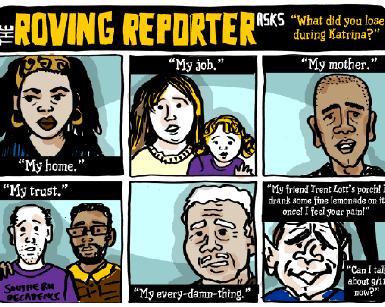
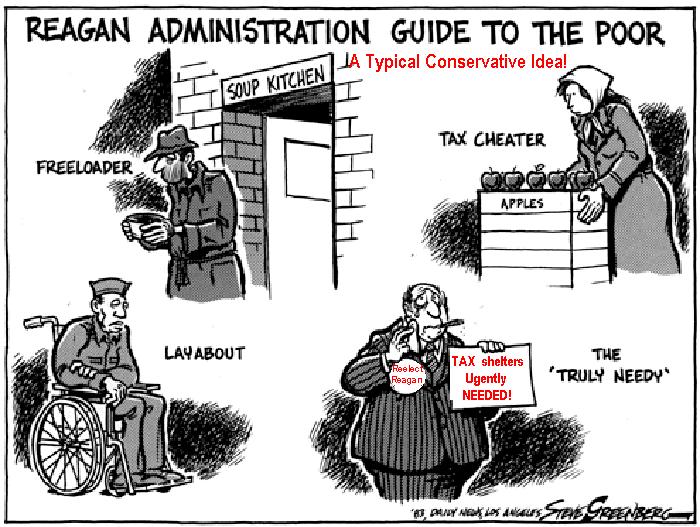
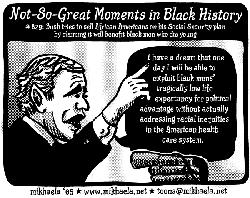

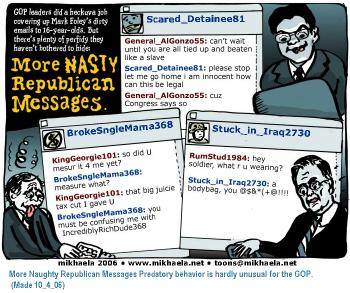
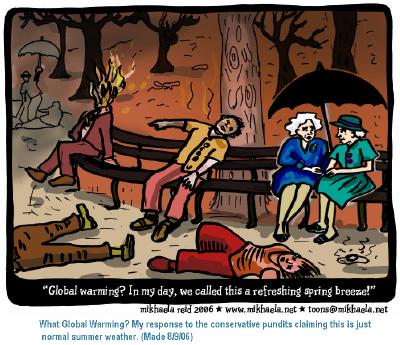

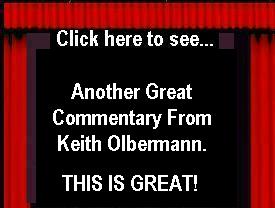

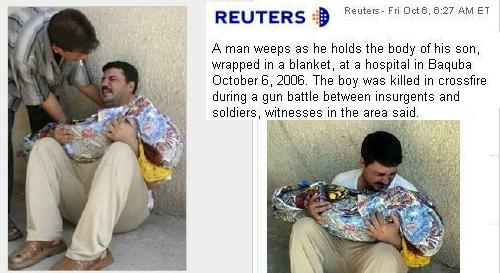
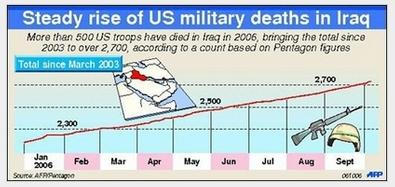







The Boiling Point, to help make this posting a little more interesting, please click on them to see the original size, easier to read... thanks Carolyn
By
snakelips Yesterday at 1:34 am EDTWow, I go out of town for a couple of days, I jump in to check out dems.org and this is what I find! I wish I had more time to write, but I would like to comment a little.
It seems to me Carolyn that you are trying to pick a fight with me. I am not mean-spirited. I don't want to fight with you and one of the reasons I responded to Adam's original post was that he sounded calm and reasonable. I think we had an enjoyable worthwhile discussion. You seem to enjoy the nonproductive name calling angle and it doesn't really interest me. I didn't bother to read your cut and paste writings from other people. I'm sure they are very well thought out and interesting, but I more want to know what YOU think in your own words.